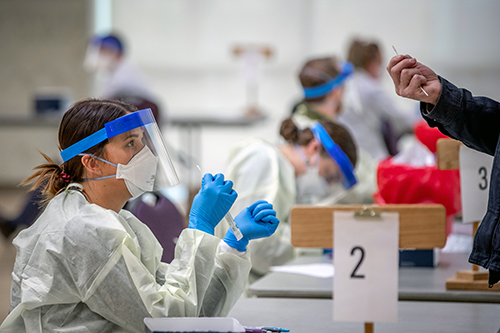WSU Offers New Course to Deepen Understanding of Pandemic
OGDEN, Utah – The COVID-19 pandemic changed learning at Weber State University at all levels in the last year — from the way courses are delivered to how students and staff interact. It’s also brought new subjects of study to campus.
This spring, the Dumke College of Health Professions offered a new course: HAS 3980, “Immunology of COVID-19.” The interdisciplinary course is taught by three faculty members: Dumke College medical laboratory sciences professor Matthew Nicholaou and health sciences/neuroscience professor Jim Hutchins, and College of Science microbiology professor Daniel Clark.
 Hutchins had the idea to create a course to help students understand and discuss the intricacies of COVID-19 and approached Nicholaou to see if he’d be interested in participating.
Hutchins had the idea to create a course to help students understand and discuss the intricacies of COVID-19 and approached Nicholaou to see if he’d be interested in participating.
“I said, ‘You know, I don’t feel like our students are understanding this pandemic and understanding the immunology behind it,” Hutchins said. “Maybe there’s a way we can use this as an entry point.’”
Students of all levels were allowed to register for the online course, which presented a slight challenge for the professors as they came up with the syllabus. So, they created two tracks – a “sky” track for students with a background in immunology and a “ground” track for those just starting out.
“We started the design of the course from the bottom up so that we could accommodate everybody,” Hutchins said. “It’s about creating a learning community – learning as a group and teaching each other.”
Forty students signed up for the course and have participated in weekly discussions this semester, ranging from basic virology and immunology to understanding why and how COVID-19 affects people’s immune systems differently. The course also touches on public health policy and the nature of the COVID-19 vaccination.
Students are taught what the data tells scientists and health professionals about the virus, but also how to interpret and judge the data, Nicholaou said.
“For me, the most important goal of this class is to give everyone a fundamental understanding of virology and immunology so they better understand the things that are going on around them,” he said.
With the pandemic still ongoing and new information about COVID-19 popping up weekly, designing the course has been a challenge, Hutchins said.
“The challenge is the firehose of information with COVID-19. We can’t keep up with it,” he said.
Nicholaou agreed, adding that a real-time pandemic shows how science is always changing and refining. He hopes the course will further the understanding of the scientific process in students, especially those who don’t have a background in science.
“It hits on another crucial point that most people find hard to conceptualize or even handle — that is, that science isn’t always definitive black and white,” he said. “Guidelines have shifted over the past year and some point to that as errors, or reasons not to trust our institutions, or just people being wrong... when in reality that is exactly what should and does happen during any scientific process.”
Hutchins’ hope is that students who take the course will take their new understanding of the coronavirus out into the community and help combat some of the disinformation that has been spread about the virus throughout the pandemic.
“The university should be a seed of knowledge for everyone. It’s something that everybody can benefit from, at all levels, by trying to elevate your community rather than just pointing out where things are wrong,” Hutchins said.
He hopes to hold the course again or offer it as a “massively open online course (MOOC),” so it could be open to hundreds or thousands of potential students.
“I’d love for the three of us to bring this to a broader community and really spread it far and wide,” he said. “The need is not going to go away when the pandemic is over. Maybe there won’t be as much interest in understanding once the pandemic is over, but one thing we know is that there's going to be another one.”
For more news about Weber State University, visit weber.edu/wsutoday.
Jessica Kokesh, social media editor
801-626-7948 • jessicakokesh@weber.edu- Contact:
Jim Hutchins, health science professor
801-626-6382 • jimhutchins@weber.eduAllison Barlow Hess, Public Relations director
801-626-7948 • ahess@weber.edu